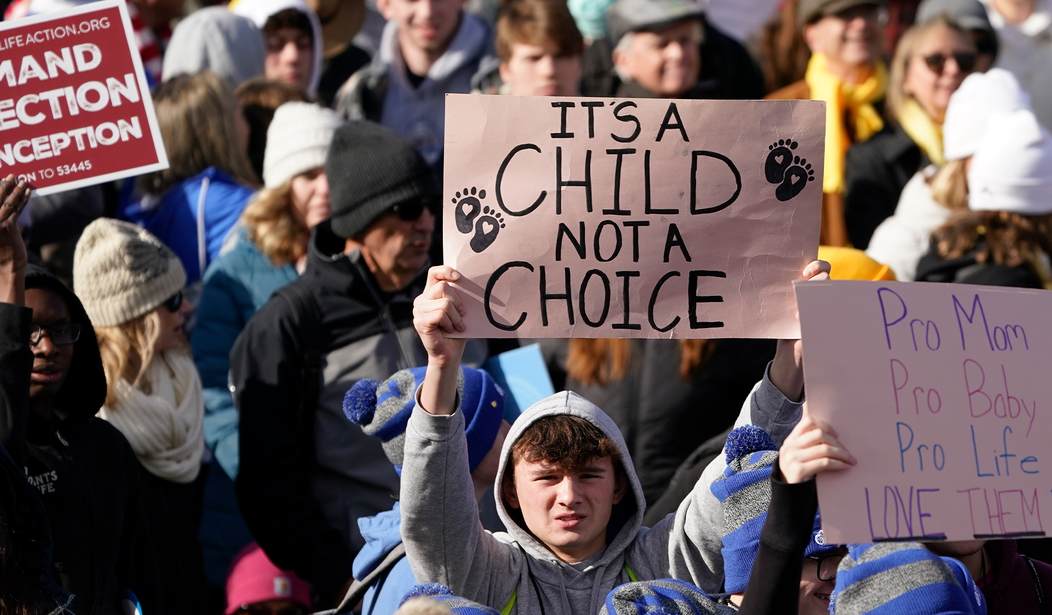On Good Friday, a judge made a ruling in Texas to sideline one of the drugs used in chemical abortions. The ruling never went into practice, and that decision will likely wind up in the Supreme Court before long. It was a sober reminder that abortion in the United States is both far from over and intensely complicated. Reactions were -- as is typical in the wake of last June's Supreme Court ruling that ended Roe v. Wade -- hysterical.
One of the reasons I write about abortion so much is that I have the perhaps naive belief that people of diverse views on the divisive issue can find some meeting ground.
Around Easter, a video went viral of a woman, evidently homeless and high on drugs, giving birth to a baby on the streets of San Francisco. Abortion is evil and the ending of a human life, this is something I firmly believe. But I can also understand why someone watching that video could conclude that it might have been better for that child not to be born. I don't agree, but I get it.
Watching the video, I thought of my own godson born with drugs in his system, nearly smothered to death by his birth mother within a month of his birth. These are not situations that should be relegated to right versus left talking points. These are people who need on-the-ground help that communities, including faith-based ministries, can give them, if we have the political and moral will to do so.
That we continue to argue about abortion and all the surrounding issues in the political realm is one of the most unfortunate things about our current situation. I am absolutely grateful that Roe v. Wade was undone. It was an unjust decision, based on bad law, bad history, bad science. (The list goes on.) It's gone, and even those who mourn its loss should be working with pro-lifers to ensure that women get the support they need in this new environment.
The 2019 movie "Unplanned" is a dramatized version of the story of Abby Johnson, a former Planned Parenthood director in Texas who eventually became a pro-life activist. The movie received an R rating. Why? For the scene where Johnson is undergoing a chemical abortion in her bathroom at home. There is a cruelty in leaving women and girls to deal with their dead babies alone. You might call it health care or freedom. But could we help women and girls not have to get to this miserable point in the first place? These don't have to be pro-life or pro-choice questions. Some of us adults on opposite sides of the issue could actually ask them together and work to find answers together, as well.
Recommended
As part of the March for Life weekend in Washington, D.C., this year, I gathered a group to hear the testimonies of two women who wound up founding maternity homes -- one called Mary's Shelter in Fredericksburg, Virginia, and the other the Mother Teresa Home in Buffalo, New York. The women founders never really planned to do such a thing, but because of personal encounters with pregnant women and girls -- one case involving the founder's own son -- they came to realize one of the primary needs for mothers is housing. Good Counsel Homes in the New York metropolitan area is a similar operation, all about meeting urgent needs in quiet ways. We need more of these efforts. Local laws often prevent government housing from receiving any kind of preferential treatment. Surely, some politicians could get to work here.
I think it has to be be safe to say that there are both Republican and Democrat voters, both Christians and nonbelievers, who don't want to see women having babies on the street, for one thing.
We're in a different time, after Roe, but many of the needs remain the same. Euphemisms hide pain, talking points exacerbate it, and neither end the underlying problems. All the noise can keep us from working together and meeting the challenges that plague our society, as a matter of policy and politics and daily life.
(Kathryn Jean Lopez is senior fellow at the National Review Institute, editor-at-large of National Review magazine and author of the new book "A Year With the Mystics: Visionary Wisdom for Daily Living." She is also chair of Cardinal Dolan's pro-life commission in New York, and is on the board of the University of Mary. She can be contacted at klopez@nationalreview.com.)

























Join the conversation as a VIP Member